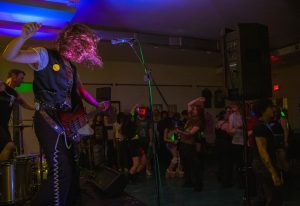Minority recruiting ranks high
October 19, 1989
NIU’s graduate student minority recruiting program is one of the top programs in the state according to one NIU administrator.
Provost Kendall Baker, at Wednesday’s Board of Regent’s meeting, told the academic and student affairs committee, “NIU is doing a superb job of recruiting minority graduate students state and nationwide.”
Baker also added that 23 percent of NIU freshmen are minorities, and there are more than 500 hispanics on campus.
“We’ve made considerable progress” in the increase of minority students on campus, Baker said. He referred to hispanic enrollment as growing by “leaps and bounds.”
NIU is “moving in the right direction,” he said.
The board met Wednesday and will meet again Thursday in the Regency Room of the Holmes Student Center at 9 a.m.
The Board of Regents governs NIU, Illinois State University at Normal and Sangamon State University at Springfield.
Baker and two assistants compiled a minority retention report which shows the distribution of both NIU minority students and faculty and the services designed to keep them on campus.
The report stated that seven new minority faculty members were hired by NIU this fall. The hiring of the new faculty members coincides with Baker’s plan to give $116,000 to each college department hiring minority faculty.
However, even with the hiring of minority faculty members, “NIU is losing minority faculty,” Baker said. There is “substantial competition” among all schools to gain minority staff, he said.
The report also shows that in the science and technical areas women representation is low, Baker said. Two-hundred NIU faculty members are women, Baker said.
Regent Clara Fitzpatrick questioned Baker when he said “we have to move women through the process.” The problem in female retention occurs because they have family responsibilities and are denied tenure more frequently, Baker said.
Financial aid and the possibility of an Amtrak train stopping in DeKalb will help retention, Baker said. “On a good day NIU is one hour from Michigan Avenue,” he said. “Minorities are not always interested in leaving the city of Chicago and coming out here.”






